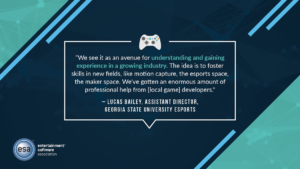May 17, 2019
Lucas Bailey is the assistant director of one of the nation’s top ranked esports programs. And he’s on the ground floor of one of the fastest growing collegiate activities in the country.
A lifelong gamer with a background in game development and entrepreneurship, he was brought on as a consultant at Georgia State University when the school started its program in the fall of 2017. These days, the program is ranked 11th in the country by Best Colleges—and Bailey oversees and coaches 24 varsity players.
Georgia State’s a relative newcomer to the college esports circuit, but it has expanded quickly. Players receive a $1,000 academic scholarship and retain the money they win in tournaments (minus any travel costs). So far, team members have split $25,000 amongst themselves.
 It’s more than just fun and games, though. Georgia State’s esports team is part of the school’s Creative Media Industries Institute, a division of the university that focuses on teaching students to work with advanced technology in the electronic and cinematic entertainment worlds. Students can work for a bachelor’s degree of independent studies, with a focus on either game development or media entrepreneurship.
It’s more than just fun and games, though. Georgia State’s esports team is part of the school’s Creative Media Industries Institute, a division of the university that focuses on teaching students to work with advanced technology in the electronic and cinematic entertainment worlds. Students can work for a bachelor’s degree of independent studies, with a focus on either game development or media entrepreneurship.
“We see it as an avenue for understanding and gaining experience in a growing industry,” says Bailey. “The idea is to foster skills in new fields, like motion capture, the esports space, the maker space. We’ve gotten an enormous amount of professional help from [local game] developers.”
Just as Georgia State’s esports program is quickly becoming more nationally prominent, the state of Georgia is expanding its reputation in the video game industry. Eighty-three game companies have operations there and the industry employs roughly 3,200 people, with an average salary of $96,000. Adult Swim Games and Hi-Rez Studios (makers of Paladins and Smite, two of the five games the GSU team focuses on in competitions) both call the state home. And, aside from Georgia State, 25 other college programs are working with future game makers.
It takes more than just a love of video games to join the GSU esports team. At the last tryouts, over 100 students competed for a spot.
Coaching esports is a little different than coaching football or basketball. There’s not much one person can do to help players improve their skills at one of five titles (League of Legends, Overwatch and Brawlhala are the other three the team focuses on). Bailey, though, says his job is more centered on teaching them some of the larger life lessons of sports, such as teamwork.
“A lot of it is about team cohesion,” he says. “Most of them have been playing the games for years, but the competitive formats of most games are you’re put on a team with some people, then never see them again. In esports, you need to develop a rapport. A lot of my job is making sure people get along, that they’re able to take constructive criticism and to let them know if they’re being too harsh when they’re dispensing their own. And they learn to work toward a common objective.”
Learn More About the Video Game Industry in Georgia:

